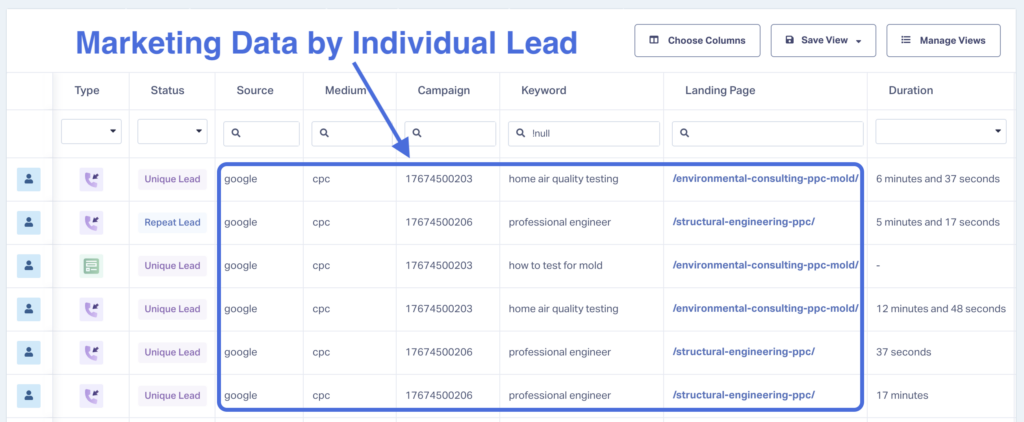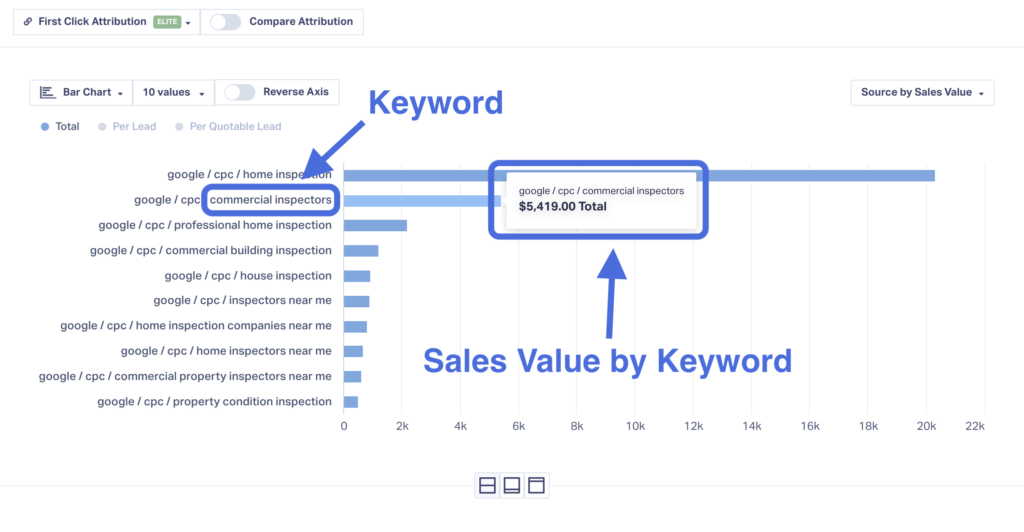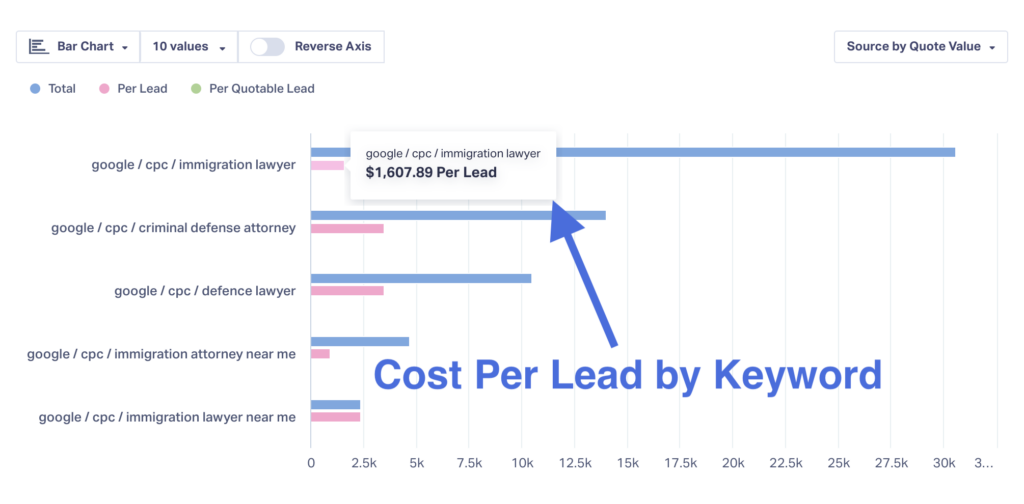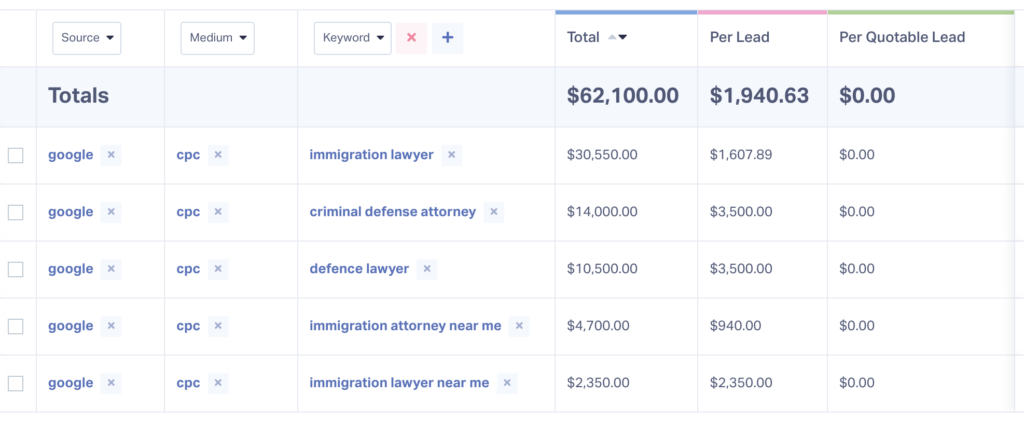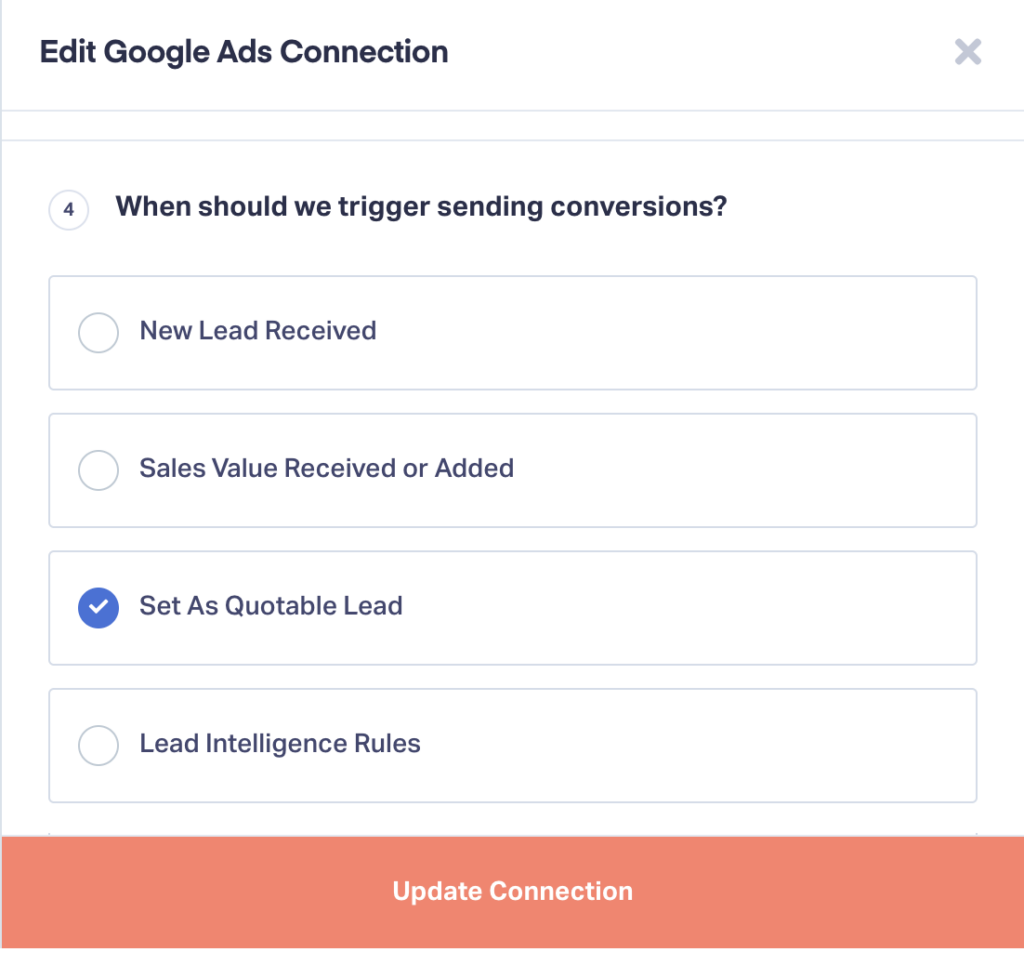
Of the 29.8 billion keywords analyzed and stored on Ahrefs, one category consistently ranks highest in cost-per-click…
Keywords related to lawyers.
That's right, keywords in the legal industry are the most expensive to target, making up nearly one-fifth of the 5,000 priciest search phrases.
For marketers running PPC for lawyers and law firms, that means you have to be extra careful about getting the best return for the budget you're working with.
This guide takes you through three Google Ads strategies you can use to maximize your ROI. We'll also look at why PPC is such a valuable marketing channel for law firms and how changes in the industry are making it harder to thrive using pay-per-click.
What Is PPC for Lawyers?
One of the most popular marketing channels, PPC (or "pay-per-click") is a form of digital advertisement in which businesses only pay when their ad is clicked. These ads can appear across the web—in search results, on social media feeds, before videos, in the side margins of websites.
Lawyers use PPC to promote their services online, ideally targeting users who need their services.
Some popular places law firms place these ads are:
- Bing
- Facebook/Meta
- YouTube
- X
That said, Google Ads is the most popular of these channels. In 2023, it held 27.1% of the market share among digital ad sellers, and ads here are four times more likely to be clicked than ads on any other search engine.
Advantages of Using PPC
Law firms use PPC as a core marketing strategy for many reasons. It allows for finite control of their budget, brings immediate results, and is easy to get started.
That said, PPC offers three combined benefits that other channels don't: The Triple T of Search Marketing.
- Targeting
- Timing
- Tracking
Targeting
The first benefit of PPC for lawyers and firms is audience targeting.
You can get very very specific with who sees your ads, from where they're located and what demographics they fit to the highly specific services they're interested in.
This hyper-focused targeting lets you pinpoint audiences who are
- In your area
- Looking for a lawyer
- Need services you offer
- And more
With a more targeted audience, you can be sure you aren't wasting money on clicks from searchers who aren't a perfect fit.
Timing
What's the difference between this:
… and this?
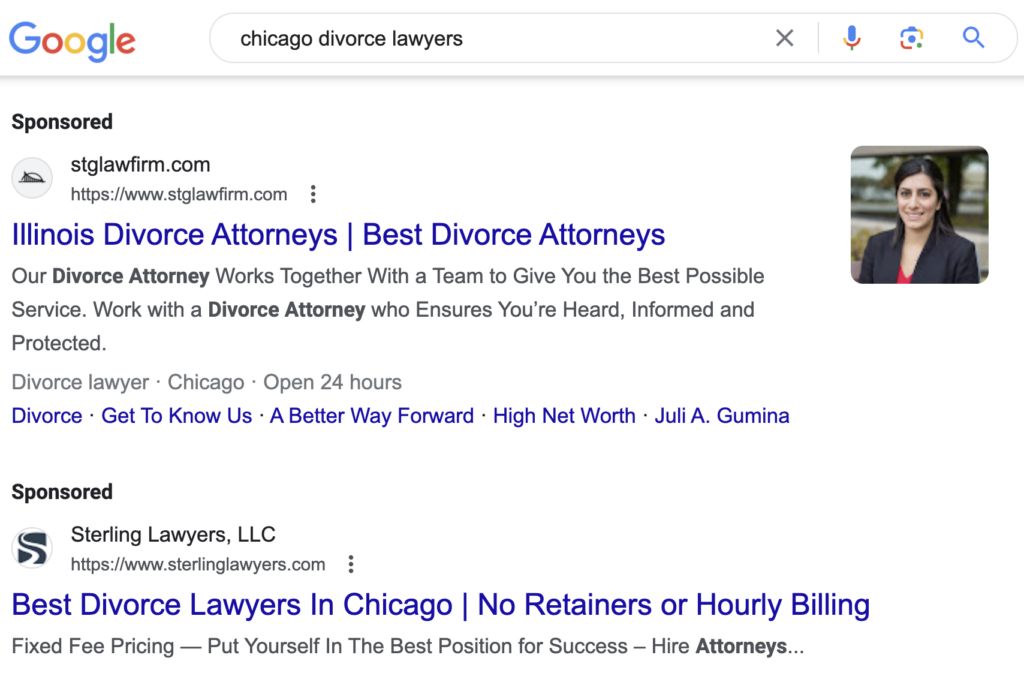
Intent.
With other advertising options, you have to hope prospects see your ad when they need a lawyer.
PPC, on the other hand, is different. You know prospects are actively searching because you've picked out keywords that reflect that intent.
- estate lawyers
- law firms near me
- Chicago defense lawyers
- divorce attorneys in South Carolina
These all signal that the searcher has buying intent and is trying to find a lawyer in their area to handle their legal needs.
The advantage here is you don't need to convince prospects they need a lawyer (they already know it). All you have to do is show why you're the best firm for the job.
Tracking
Finally, PPC for lawyers has exceptional tracking potential compared to other channels.
With the right tools, you can see the exact results each piece of marketing produces.
For example, WhatConverts lead tracking lets you see leads and even revenue generated by:
- Keyword searched
- Ad variation clicked
- Landing page visited
- Campaign converted on
With that level of granularity, you can easily track how effective each marketing effort is, eliminate the low performers, and get more bang for your PPC buck.
What About Google Ads Reporting & Google Analytics?
Google Ads and Analytics both can track data similar to what lead tracking tools capture. The difference is they show an aggregate of this data—a tally.
Lead tracking tools, on the other hand, show you aggregate data while also letting you zoom in to see who those leads are, whether they became customers, and how much they are worth.
It’s the difference between seeing the keyword ‘divorce lawyers near me’ resulted in 50 clicks versus it resulted in three new clients (John Smith, Jane Doe, Fred Flinstone) which brought in $23,000 for your firm.
Which would you rather have?
Does PPC Marketing Work for Law Firms?
Thanks to the Three T's of Search Marketing, PPC marketing can be a fantastic source of new clients.
Law firm marketing agencies like Constellation Marketing have used PPC to grow their clients' revenue by an average of 300%.
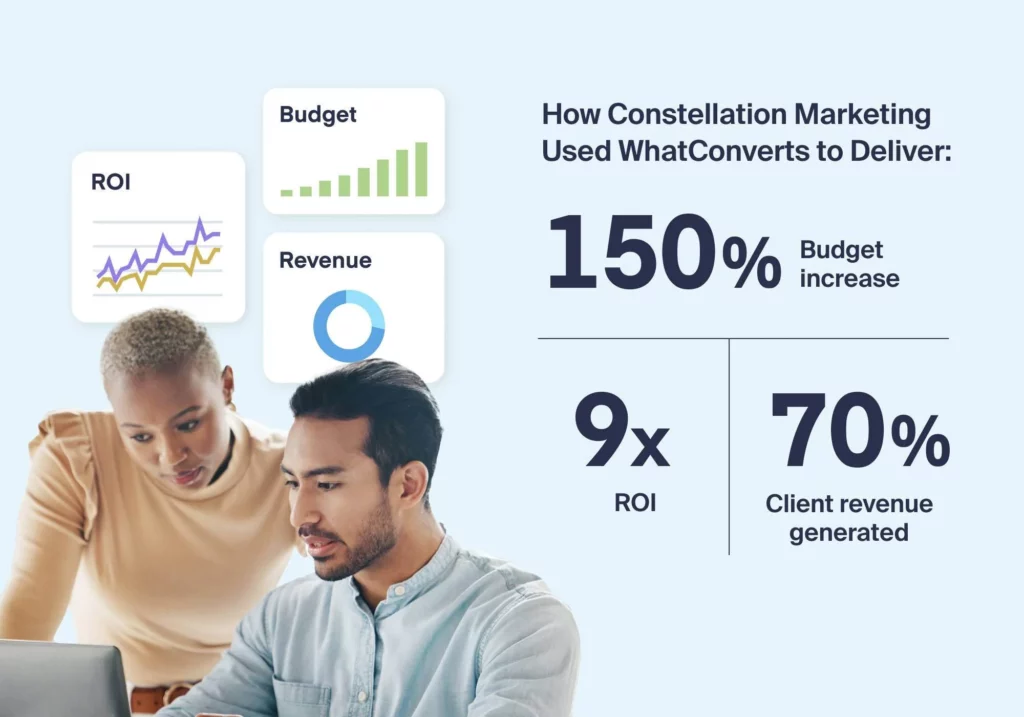
Case Study: Law Firm Marketing Agency Turns Client’s Doubt into a 9X ROI Win
However, success with the channel depends on three factors:
- Time – Successful campaigns take lots of testing and iterating. So, while leads may come in immediately, a healthy ROI might take weeks or months of hard work.
- Experience – Getting started with Google Ads is easier than ever, but thriving on the platform still requires skill (the three strategies outlined below are a great start).
- Strategic Budgeting—Pouring money into generic keywords just doesn't work anymore. Today, firms need to be more careful than ever about which audiences and keywords they target.
Many law firms rely on marketing agencies to handle their PPC campaigns. These agencies have the skills and expertise to use PPC effectively and maximize ROI.
The PPC Challenge: Higher Costs & More Competition
Most law firms and marketing agencies use Google Ads as their core PPC channel because of the Three Ts of Search Marketing above.
However, each year, Google Ads and PPC are becoming more expensive.
The 2022 vs. 2023 benchmark data shows a 5% increase in cost-per-click and a 20% jump in costs per acquisition.
The reasons here aren't entirely known. Some PPC experts believe it's inflation, some point to rising competition, and others are convinced undisclosed price hikes across platforms are to blame.
No matter what is to blame, though, the takeaway for law firm marketers is this:
Earning a solid ROI from PPC requires more strategic marketing than ever.
3 Strategies for Maximizing ROI with Google Ads
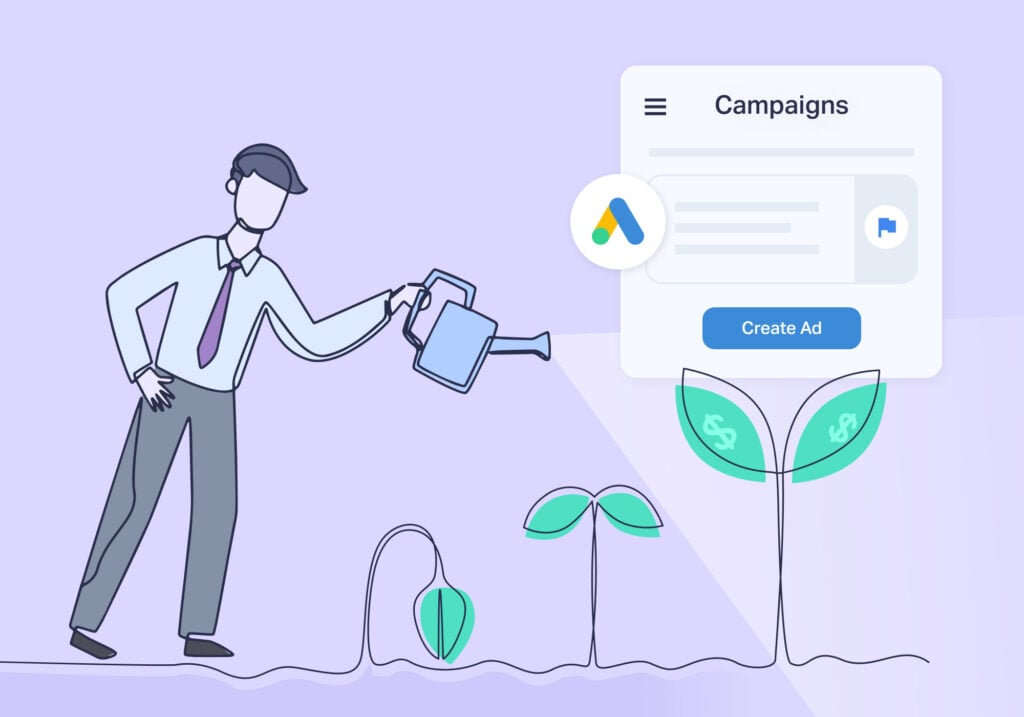
Below are three ways to be more strategic with your PPC budget so you can maximize your law firm's ROI.
Uncover Hidden-Gem Keywords & Optimize
Generic keywords like "lawyers near me" and "attorneys in Westbrook" may seem like obvious choices for targeted keywords. But that's the problem—if they're obvious to you, they're obvious to competitors.
Don't throw your budget away on a bidding war with the competition.
Instead, uncover the hidden gem keywords with lower search volume and higher intent and then optimize to target the ones with the highest value.
Here's how to do it.
Step 1: Use Voice-of-Customer Data to Find New Keywords
Your goal here is to uncover the keywords leads are actually using to describe your services.
For example, let's say you'd like to target "probate lawyers" in your area, but competition has driven the cost-per-click way too high for your budget.
Instead of fighting that losing battle, you can use WhatConverts to learn precisely what language your customers use and uncover keywords you haven't considered.
Just:
- Click "View Lead"
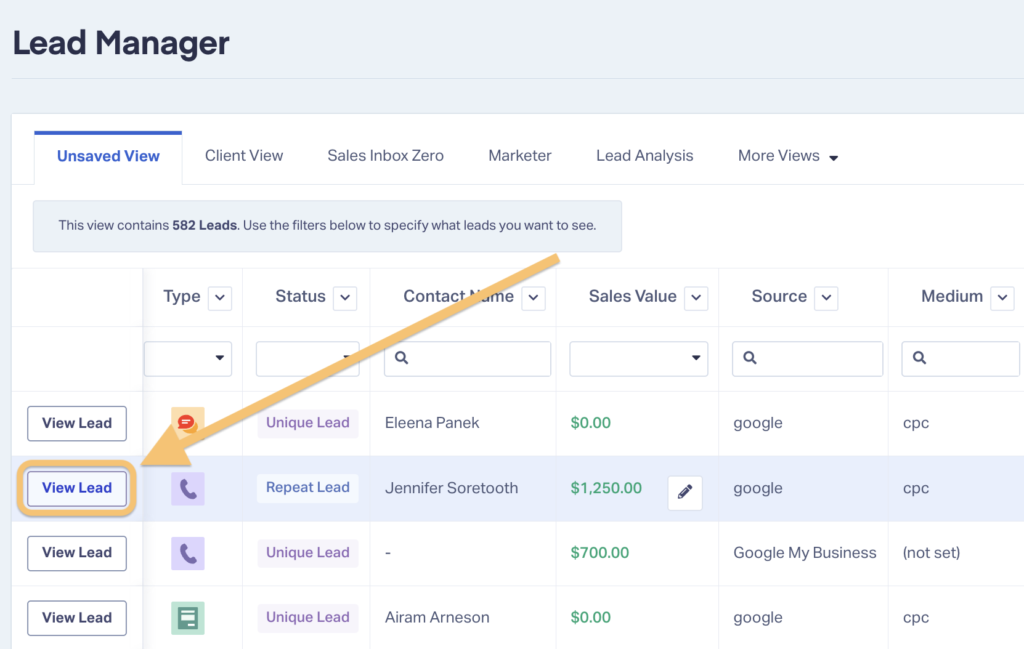
- Listen to call recordings, read the transcript, or view Lead Analysis data
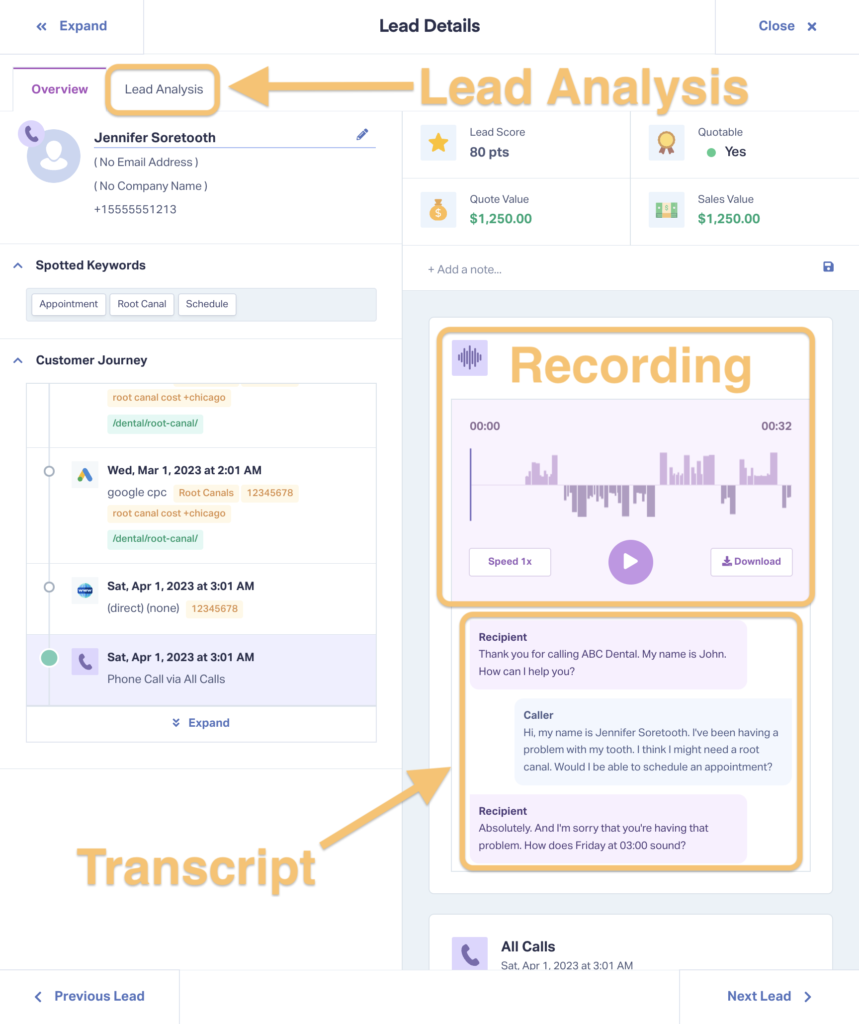
- Find out how leads are talking about your services
Now, rather than blowing your budget on "probate lawyers", you can target:
- Family will lawyer
- Stolen inheritance lawyer
- Lawyer for inheritance dispute
All are 1) much more affordable keywords and 2) phrases your customers are actually using.
Step #2: Optimize for the High-Performers
Once you've let your hidden gem keywords run for a few weeks, it's time to optimize.
Which keywords are performing the best? Which aren't bringing in enough revenue to justify the costs?
Once you know that, you can double down on the winners and cut the losers.
Warning: Use Value Earned, Not Clicks or Impressions
While clicks and impressions are good proxies for success, revenue earned is a much more powerful metric. Without it, you can’t understand the true ROI of your marketing.
Lead tracking tools let you assign a hard number value to your marketing, down to the keyword that brought in the sale.
This level of granular attribution lets you see valuable performance KPIs like:
- Cost Per Lead
- Cost per Quotable Lead
- Total Sales Value Generated
Here's how that data is shown in WhatConverts:
Now, you can see exactly which keywords to invest more of your budget in and which to eliminate entirely.
Find the Right Bidding Strategy
Google gives you a lot of control over where you want to spend your budget. Thanks to bidding strategies, it also lets you determine how to do so.
A bidding strategy is a plan for how you want your Ads account to spend your budget. These strategies use various goals to determine how much to bid for a click. There are lots of strategies to choose from.
To maximize your budget's ROI, you must be careful about your chosen strategy.
Google provides a pretty easy-to-understand breakdown of each here:
That said, more seasoned marketers may want to use the handy table from Search Engine Land below to determine which strategy best aligns with their goals and situation.
| Bid Strategy | Will It Spend All Your Budget? | When Should You Use It |
| Manual CPC | If your bids are especially aggressive. | Branded Search campaigns, only use with Phrase/Exact Match keywords. |
| Maximize Clicks | Yes, very likely. | New campaigns when you want to drive traffic and gather data. |
| Target Impression Share | Only if there are no limitations (Max CPC. Target Impr Share). | Branded Search campaigns, only use with Phrase/Exact Match keywords. |
| Max Conversions | Yes, very likely. | For new campaigns looking to gather data and push conversions. Utilize Broad Match keywords. |
| Max Conversion Value | Yes, very likely. | For new campaigns looking to gather data and push revenue. Utilize Broad Match keywords. |
| Max Conversions w/ Target CPA | Unlikely. Only if tCPA is high enough | Most Lead-Gen campaigns (Search, Shopping, Performance Max, YouTube, etc.) Unless you have Offline Tracking (Revenue) so you can use Target ROAS. |
| Max Conversions w/ Target ROAS | Unlikely. Only if tROAS is low enough | Most eCommerce campaigns (Search, Shopping, Performance Max, YouTube, etc.). |
Source: Menachem Ani, Founder of JXT Group vis Search Engine Land
Learn to Train the Algorithm
If you decide an automated bidding strategy is right for you, be sure you're using it to its full potential by training the algorithm.
Google's algorithm drives automated bidding. Based on your campaign goals, Google's machine learning models will automatically decide how much to bid on certain ad groups and keywords. That means you don't have to do so manually.
So, if your goal is to maximize conversions, Google will bid higher on clicks that are more likely to convert (based on the data Google collects about that user).
The critical point to understand is this:
Like any other machine learning model, automated bidding is only as good as the data you feed it.
For instance, if you get 1,000 calls from an ad and 995 are spam, Google will be more likely to send more spam your way. Why? Because those spam calls are the most likely to convert (i.e., call).
So, how do you train the algorithm to target only good clicks? By feeding it only quality leads.
Case Study: Agency Learns How to Train the Algorithm, Wins 12.4X ROAS
The WhatConverts Google Ads integration lets you do that by only sending specific leads back to Google as a conversion.
You can choose to send:
- New leads
- Only leads with a sales value
- Only quotable leads
- Leads with custom characteristics using Lead Intelligence
With this level of control, you can guide the algorithm to target searchers who are more likely to convert or even choose a particular service (probate law vs. criminal law).
And that means better ROI for your budget.
Check out the guide below for more details on how to train Google's algorithm.
How to Optimize Google Ads Automated Bidding for Better Results
Wrapping Up
Like many other industries, PPC is a great option for law firms that want to attract more clients.
But to maximize your ROI, you can't just throw money into Google Ads and hope for the best.
You need to be strategic with your keywords, intentional with your bidding strategy, and careful with how you leverage automated bidding.
If you can do that, your law firm's PPC efforts will be well worth the investment.
Want to get the best ROI from your law firm’s PPC marketing? Try WhatConverts for free for 14 days!
Get a FREE presentation of WhatConverts
One of our marketing experts will give you a full presentation of how WhatConverts can help you grow your business.
Schedule a Demo
Grow your business with WhatConverts







